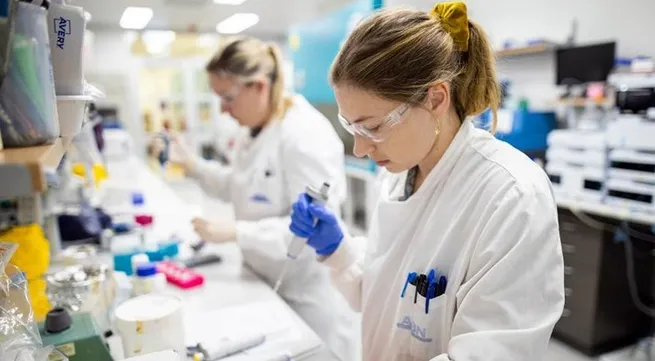Global cooperation to overcome challenges

Bad crisis
Starting in China in December 2019, the Covid-19 epidemic began to spread rapidly and widely around the world from early 2020. Until the World Health Organisation (WHO) announced Covid-19 as a "global pandemic" on March 11, 2020, searching for the word "pandemic "on the websites immediately increased at a dizzying rate. This reflects an incomplete understanding of the tiny, borderless virus that has crept into the corner of the lives of all people and communities around the world, no matter great power or small country, rich or underdeveloped country. Therefore, it is not difficult to understand that the immediate reaction of most countries and territories in the face of Covid-19 was self-defence, instead of seeking multilateral solutions.
By early 2020, blockade measures were considered by many countries to be the only option for disease control. Countries and regions seek to prevent the spread of Covid-19 by restricting movement, suspending many unnecessary activities and exercising social distancing. The strict measures saved many people, contributing to control the disease, but also caused the worst economic recession since the Great Depression of the 1930s. For example, just a few weeks after the raging Covid-19, a third of the global economy was closed, most sectors were paralyzed. After six months, the world economy was officially determined to have fallen into a recession, similar to or even worse than the Global Financial Crisis of 2008-2009. In the report of the International Monetary Fund (IMF) published in mid-June, Covid-19 pandemic then affected all geographic areas, "washed away" all US$12 trillion of wealth in the world, making global GDP decline by 4.9% compared to 2019, much higher than the 0.1% decline at the time of bankruptcy of Lehman Brothers in 2008. Many major economies continuously reported falling into recession, some not long after being attacked by Covid-19 pandemic, and the list of economies in recession was still increasing until the end of 2020.
After the initial panic period, the countries where most severely affected by the pandemic also gradually reopened their economies. But the pessimistic sentiment about the world economic growth outlook is still there. The general judgment of international organisations still affirms that Covid-19 pandemic places the global economy in an environment with full of uncertainty. At the beginning of the crisis, many predictions about a rapid recovery, in the V-shape, with the expectation that stimulus packages are large enough will help the world economy regain its growth momentum. However, by the end of the year, the V-shaped recovery model was not mentioned much. The difficulty is not only in countries where Covid-19 cannot be controlled, but also in countries that are considered to have been initially successful in pandemic response. Prospects for recovery become bleaker when many countries and territories are still struggling to implement dual goals on imposing strict restrictions on disease control and restoring economic activities. According to the IMF, the world economy has shown positive signs after a period of serious decline due to Covid-19 pandemic, but the prospect of recovery depends on many factors, especially development, production and distribution of the Covid-19 vaccine, coupled with the level of geopolitical tension in many regions.
Reviving multilateral spirit
Economic recession and public health crisis are manifestations of the multidimensional impact of the pandemic, but there are also other "shocks", no less serious. Covid-19 pandemic widened the divisions between countries and regions, further revealing the crisis of collective leadership and global action. The distrust, mutual accusations between the US and China regarding the Covid-19 origin, and the opposite move of the US to withdraw its commitment to support WHO, have caused the two superpowers to lose their leading role in handling the unprecedented medical crisis. The race to own the Covid-19 vaccine has been fierce, and the risk of "nationalism" has not been eliminated. Collective efforts to control the epidemic and to support poor countries in coping with Covid-19 and recovering from the pandemic are uncertain. This reality poses a great challenge to multilateralism and international cooperation, which is an urgent requirement and the best choice to bring the world through the pandemic.
Affirming that no single country can overcome the pandemic on its own, United Nations Secretary-General António Guterres called for global solidarity, a worldwide ceasefire and a cessation of unilateral sanctions, to gather resources against epidemics and support people to overcome the crisis. The 75th session of the UN General Assembly adopted a resolution, taking the December 27th as the International Day of Epidemic Preparedness. This is the first international step in raising the awareness of all countries, people and communities, and strengthening international cooperation in disease impact prevention, control and response, which is one of complex borderless challenges in modern times.
Cooperation in Covid-19 vaccine development and distribution, coordinating measures to bolster economic recovery are prominent issues in regional conferences, forums and high-level regional and international discussions. As the world's largest economies, the G20 has been led the way in promoting cooperation and assisting less developed countries to overcome the crisis. The multilateral message is highlighted, expressed through a commitment on ensuring the right to access and distribute vaccines in an equitable, widespread and effective manner; maintaining and expanding the mechanism of debt reduction, stretching and write-offs for poor countries in order to help them focus their resources on fighting disease and recovering the economy in the post-Covid-19 pandemic.
At the regional level, ASEAN emerged as a central role, being a common home for member countries to overcome the "Covid-19 storm", in which the outstanding efforts were made to implement a dual goal, maintaining a community building momentum as well as effectively respond to the Covid-19 pandemic. ASEAN was the region to take the earliest action in preventing the spread of the epidemic. A challenging year has witnessed the enduring efforts of ASEAN, with the spirit of “Cohesion and Proactive Adaptation”, demonstrating strong, solidarity and unity, maintaining cooperation to respond to multiple challenges from epidemic crisis. For external relations, ASEAN has taken an important step, when upgrading its dialogue partnership with the European Union (EU) to a strategic partner, reflecting the common strategic vision of the two regional organizations on multilateral cooperation, for peace, stability and development of the world.
Similarly, APEC has made a landmark progress in adopting the APEC Vision to 2040, in preparation for a new phase of development in the third decade of the 21st century, as well as contributing to the consolidation and promotion of promote multilateralism and regional cooperation. In the context of a pandemic damaging trade chains, economic links and regional connections, the Forum's two-decade strategic vision is a timely preparation for the post-COVID 19 period, aiming to restore regional economic and trade growth, aimed at building an open, dynamic, resilient Asia-Pacific community for peace and common prosperity of all people.
The world history can be recognized that the Covid-19 pandemic is one of the most influential events of the 21st century, changing the way many societies and governments operate. However, the unwavering goal is to maintain the rules-based world order, uphold the spirit of multilateralism, and global cooperation is the mainstream in international relations.





